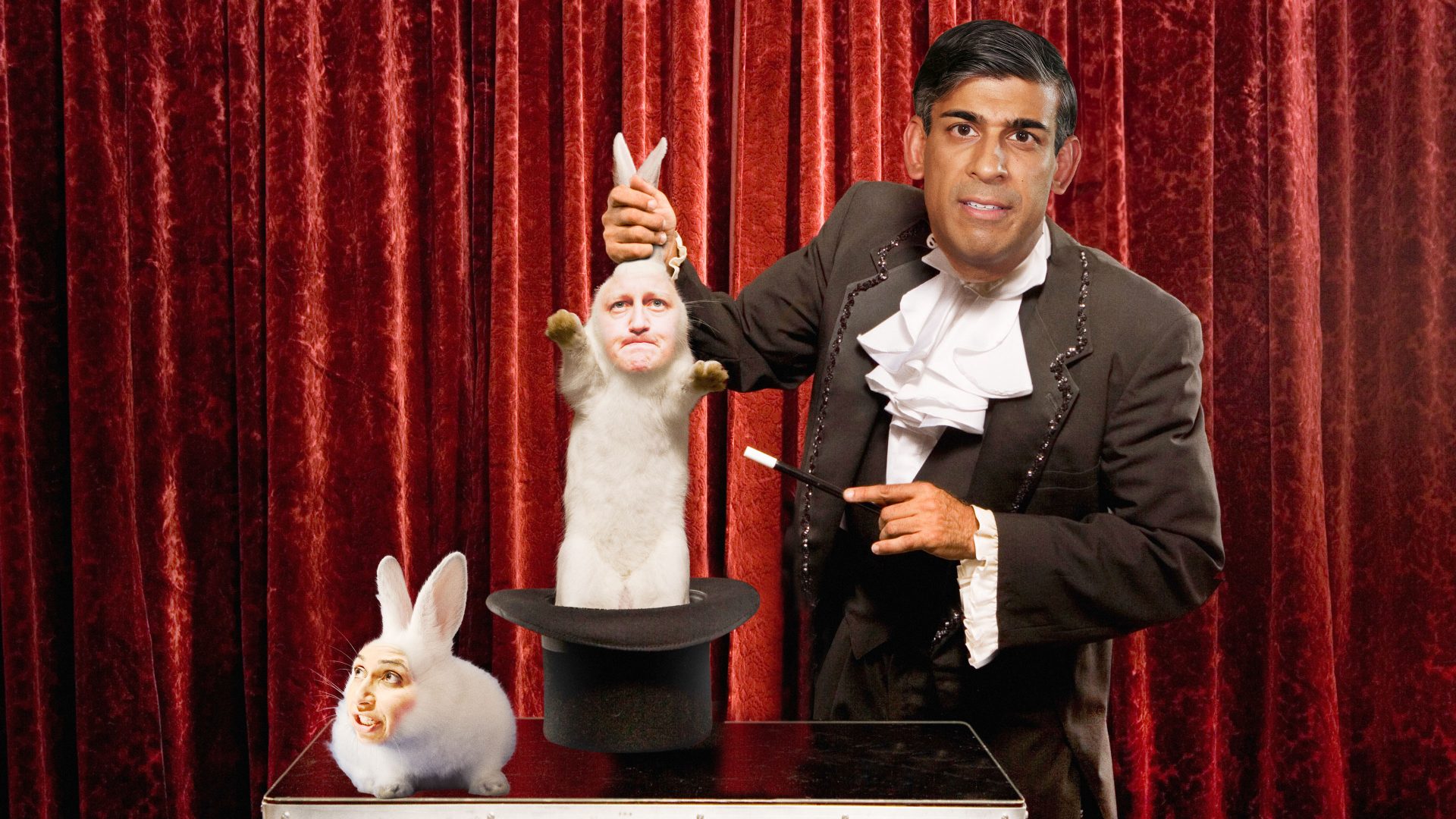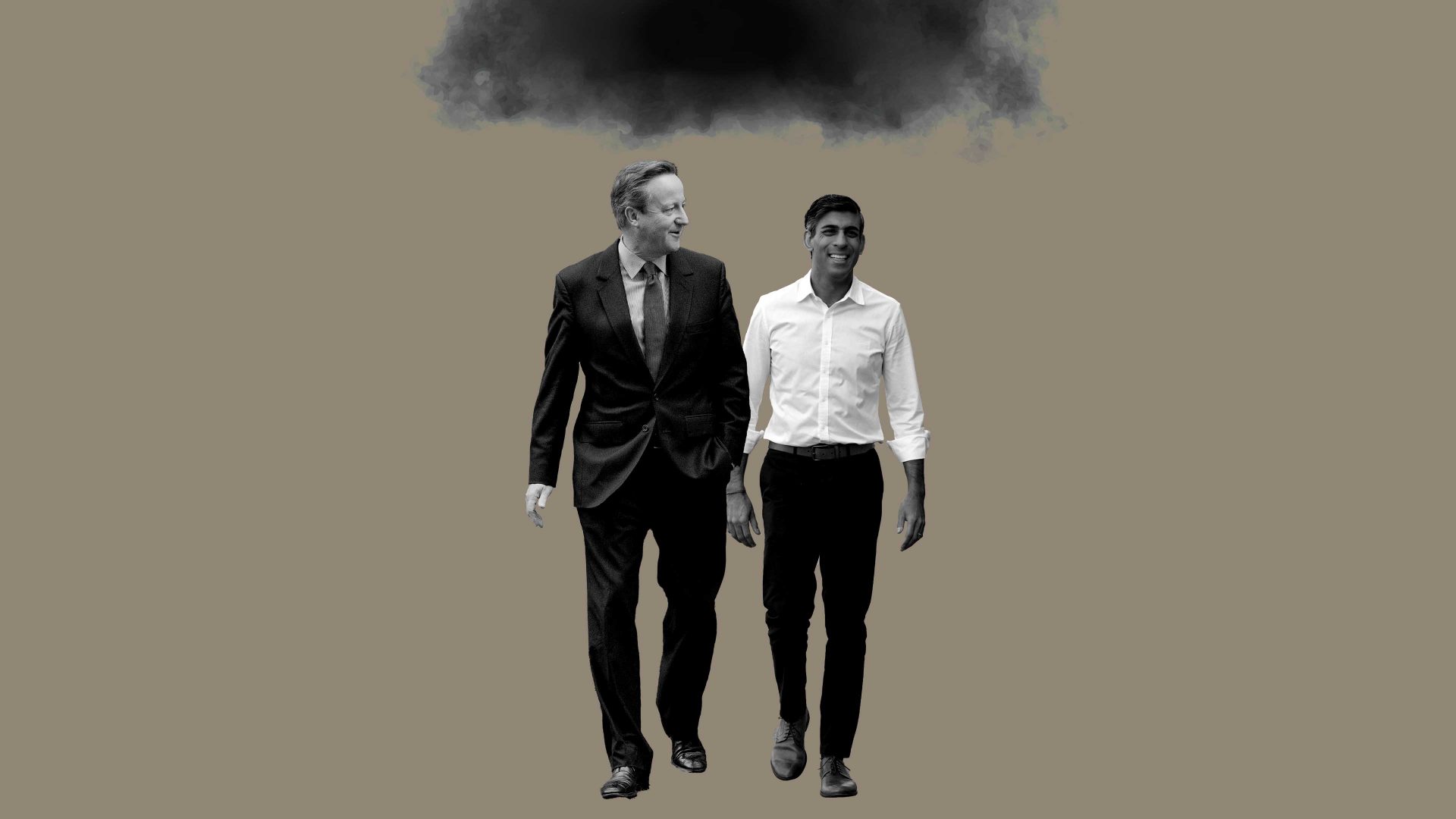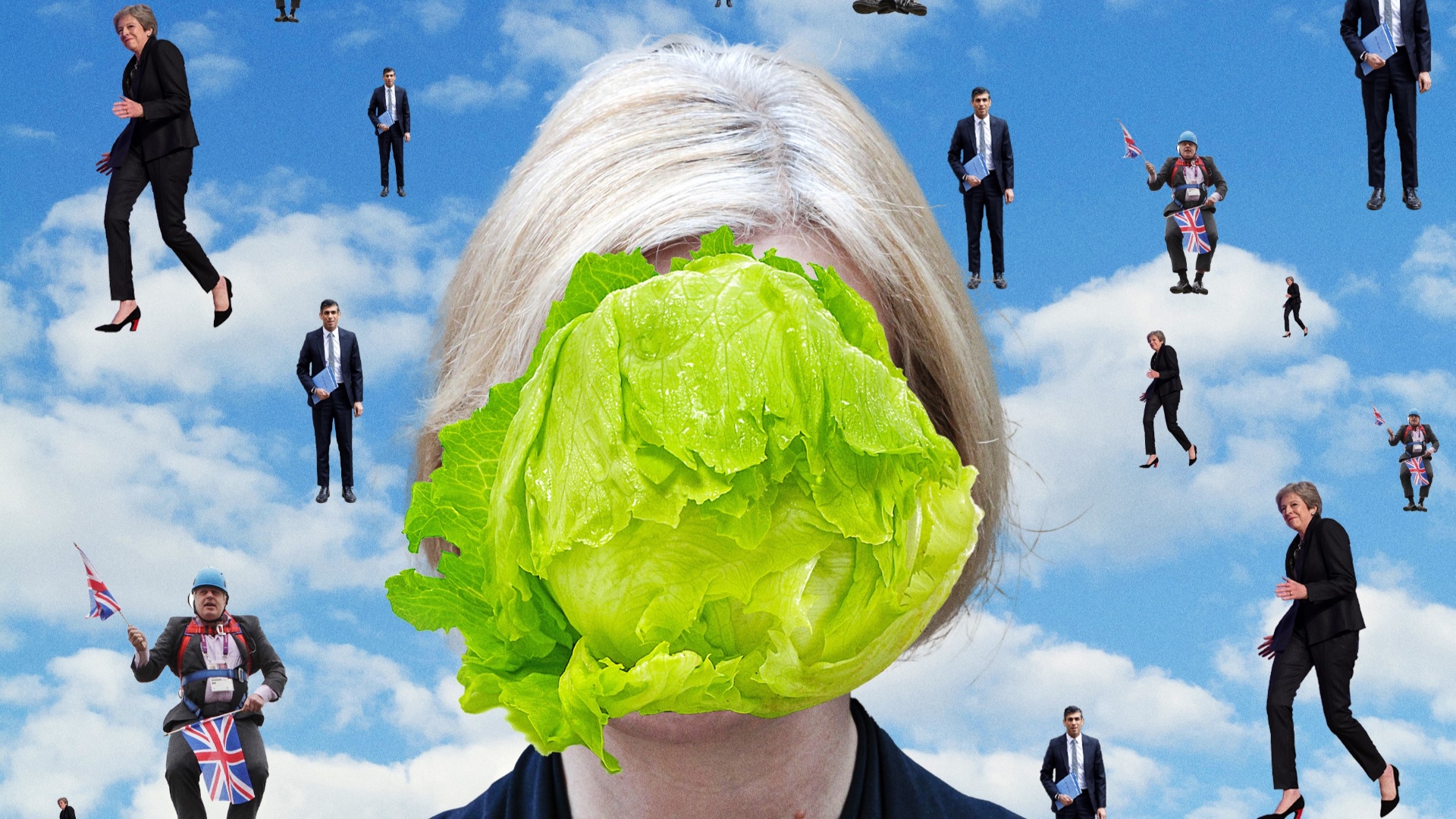Not every old trick needs a new spin on it to keep it fresh. Should a children’s magician decide to remix the old rabbit-from-the-hat trick by opting for a bleeding, dead bunny instead of a live one, he is unlikely to get a great reception – or to get paid.
You would assume for all but the very most inept magician, one attempt at this might be enough to see that it doesn’t work. But this seems to be the approach that Rishi Sunak is taking to trying to salvage his shattered reputation and keep his administration going. Never mind Sir Lynton Crosby’s advice about throwing a dead cat on the table; Sunak is locked in a pattern of pulling out dead rabbit after dead rabbit from his hat, perhaps hoping to eventually find the audience that will find such macabre trickery impressive.
Part of why Sunak fails in these constant attempts to pull off a magic trick to save his career is that he is not just a terrible showman, he’s an unlucky one. He has somehow been convinced that success in politics depends on stunts that play well for the media or disrupt your rivals, rather than on having a coherent set of beliefs that are reflected in well-thought-through policies (watching the man who was in No 10 when he was chancellor might have had something to do with this).
And so there is one crowd-pleasing stunt after another, none of which seems to please the crowd.
Apart from – initially at least – Eat Out To Help Out, a pandemic-era scheme aimed at helping the hospitality industry that bizarrely only paid you if you ate in (you got nothing for a takeaway). Cheap summer eating out was, of course, popular – but the timing coincided with a rise in Covid cases. The scheme is widely believed to have contributed to the UK’s second wave of Covid, the need for additional lockdowns, and to deaths from Covid.
It emerged in the Covid inquiry earlier this year that Sunak’s nickname among some officials had become “Dr Death”. It is telling of the wildness of current news cycles that this didn’t lead the front pages.
Since then, things have – in political terms at least – only got worse. To be fair to Sunak, he started with the weakest hand of any prime minister in the modern era. He had been roundly defeated in a leadership contest just seven weeks earlier, and was selected as leader, extremely grudgingly, by a party desperate to avoid the indignity of another contest.
This lack of any kind of political authority or mandate was compounded by inheriting an economic crisis that was entirely the fault of his predecessor, leaving Sunak cleaning up a mess he wasn’t really responsible for before he could start to have any agenda of his own.
A bit of honest dealing could have helped Sunak get his premiership off to a decent start – but instead he tried, as would become his trademark, to be too clever by half, by making five pledges to the nation. Four of the five are nowhere close to being achieved, and look all but impossible even by the latest possible election date, and the fifth was a pledge to halve inflation.
There is almost nothing the central government can do to reduce inflation: it is largely in the control of international commodity prices, and domestically is the remit of the Bank of England. At the time of the pledge, inflation was already expected to halve within a year – meaning Sunak was doing the political equivalent of trying to take credit for the rising of the sun.
Despite that, it almost didn’t work. Britain’s especially difficult situation, made worse by Brexit, meant UK inflation remained stubbornly high for a lot longer than most economists had expected, meaning that the accidental prime minister had personally made himself accountable for a bad situation that wasn’t in his control.
When inflation finally did halve this month – though its present rate is still twice the official target – Sunak and his team attempted to celebrate this as a victory with a series of over-the-top social media posts. But this “success” was immediately overshadowed by the result of another of Rishi’s ruses: by trying to force through Suella Braverman’s expensive, cruel and hopeless Rwanda plan, Sunak invited an inevitable Supreme Court challenge. With grim inevitability, that government defeat was announced the same day as the “good” news on inflation – completely overshadowing that news.
Bringing back the already disgraced Braverman as home secretary in the first place was another tragic trick; another dead rabbit out of the hat. It was supposed to calm down the mad hard right of the Tory Party, who after her firing are now madder than ever.
Sunak’s positioning has ricocheted around like a pinball in a malfunctioning table. He was to be a kinder, gentler prime minister, until he was persuaded that there were votes in being anti-woke (there weren’t) and anti-green (there weren’t, apart from in Uxbridge).
Then, during the summer, Sunak pivoted to “long-term decisions” to set up the future, all while he cancelled or watered down actual long-term commitments – such as HS2, or the UK’s net zero promises.
Why he tried to position himself as a long-termist while doing nothing but cancelling commitments and when he had at most a year before a general election was beyond the wit of mortal men, but after a few more weeks of pushing the long-term line while fighting the culture wars, Sunak decided he’d found a new trick.
Summer Rishi – the one who presented himself as the change candidate, a break from the 12 years and four prime ministers of his party that preceded him – was dead. Instead, Winter 2023 Rishi (so far) is captain continuity: so much so that he’s brought the first of those four prime ministers back into his cabinet.
It is safe to say that Sunak got one over on the lobby – and most of the Westminster bubble – with this one. None of us saw it coming.
But just because it’s a surprise doesn’t mean it’s good: dead rabbits again. That David Cameron is seen as a more respectable figure on the world stage than the alternatives says more about them than him: his credibility with Europe is, for obvious reasons, shot.
Cameron brings with him immense baggage. His government was the architect of austerity, whose consequences are why public services today are on their knees.
By hiring him, Sunak has in effect re-endorsed that austerity agenda, right at a time when it would suit him to deny it. Cameron’s return to government makes the Greensill lobbying scandal, which has been relegated deep to the inside pages of the papers, incredibly relevant again.
And expect to see much coverage and many Conservative Party ructions over Cameron’s ties to China – a major adversary in the eyes of many Conservative MPs, and a serial human rights violator to anyone with eyes.
Time and again, Sunak seems to value the novel or the surprising over the sane. Surely there must come a time when he realises he’s just no good at tricks – and should either get on with trying to do the day job, or else hand it over to someone else.




